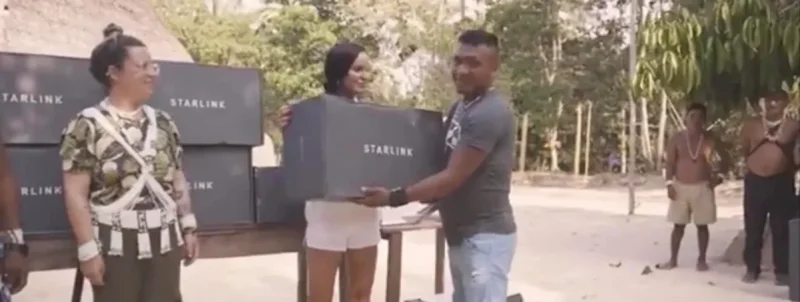Brazilian indigenous gets addicted to porn after Starlink

The Starlink satellite internet has brought numerous benefits to remote populations, such as the Marubo indigenous tribe located in the Vale do Javari Indigenous Land in western Amazonas. Previously, with communication difficulties due to a lack of infrastructure, the Marubo can now access emergency services, maintain contact with distant relatives, and quickly issue health and environmental alerts. This connectivity, provided by Elon Musk’s company, represents an important tool for digital inclusion for these isolated communities.
Despite the advantages, the introduction of the internet has also brought negative consequences, especially noticed by the older population. Traditional cultural activities, such as body painting, fruit gathering, and making accessories, have lost space to the intense use of cell phones among the youth. Tsainama Marubo, a 73-year-old elder, expressed concern about the behavior change in the young people, who now spend more time on social media than on cultural practices.
“The young people have become lazy because of the internet. They are learning the ways of the white people. But please, don’t take our internet away,” she said.
Additionally, the community observed an increase in the consumption and sharing of pornography, something unprecedented among them. According to Alfredo Marubo, this has negatively influenced the behavior of the youth, raising concerns about changes in socialization patterns.

Starlink arrived in Brazil in January 2022, with authorization from Anatel, and quickly expanded through the Amazon. Within a few months, 90% of the municipalities in the region had access to the service. The Starlink antennas reached the Marubo through activist Allyson Reneau, with the support of community leader Enoque Marubo.
Although some critics question whether indigenous people should have internet access, Reneau defends digital equality as a means to combat prejudice and promote social justice. “To those who believe that indigenous people do not have the right to the same internet access as white people, it is essential to combat prejudiced and misinformed ideas. (…) Indigenous peoples have the right to integrate into the digital world if they so wish and use technology to strengthen their communities and cultures. Respecting this right is promoting equality and social justice,” Reneau argues.
However, Starlink’s internet has also facilitated illegal activities such as logging and mining, providing quick communication for these purposes. Despite these challenges, the Marubo community views connectivity as a right and an essential tool for development and integration into the modern world.

The introduction of the internet has drastically changed the daily life of the Marubo. Enoque Marubo mentioned that the daily routine in the area changed drastically in the past month, causing members to no longer want to work.
“It changed the routine so much that it was harmful. In the village, if you don’t hunt, fish, and plant, you don’t eat.” They report that they now depend on the network for many of their daily activities and fear losing this resource. “I think the internet will bring us many more benefits than harm,” said Enoque. “Please, don’t take our internet away,” added TamaSay Marubo. Enoque believes that despite the initial problems, the benefits of the internet will outweigh the harms, as connectivity has brought more opportunities for communication and development.
The Marubo’s story exemplifies the multifaceted impacts of technology on traditional communities. While connectivity offers opportunities for development and global integration, it also challenges the preservation of cultural practices and community values. The search for a balance between tradition and modernity continues to be a challenge for the Marubo and many other indigenous communities facing similar transformations.
The Marubo, an isolated Amazon tribe, connected to high-speed internet in September through Elon Musk’s Starlink. Jack Nicas, our Brazil bureau chief, visited the tribe’s remote villages to see what the internet has changed for them. https://t.co/JXwhPDcR3L pic.twitter.com/7CKCHsY4QX
— The New York Times (@nytimes) June 2, 2024






